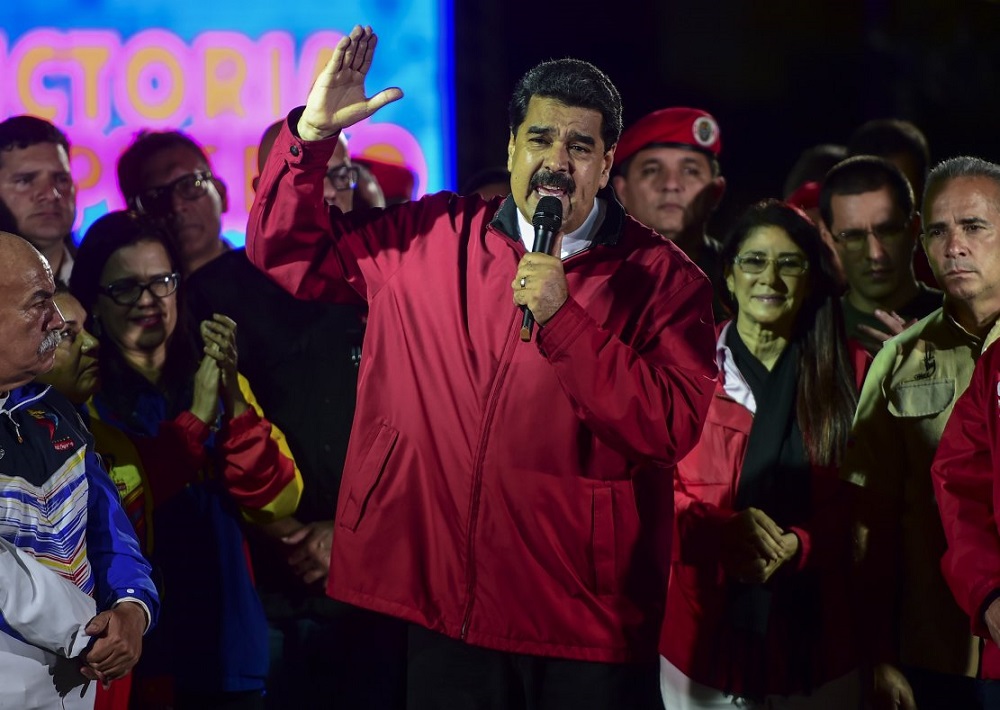Two of Venezuela’s most prominent opposition figures were arrested overnight on Monday hours after President Nicolas Maduro announced a victory in the election for the much-maligned Constituent Assembly, which the opposition says will cement a dictatorship in the South American country.
Leopoldo Lopez and Antonio Ledezma were both already under house arrest when they were picked up by the intelligence service known by its in acronym Sebin, the wife of Lopez and children of Ledezma said separately.
Both had called for a boycott of Sunday’s vote for a so-called and all-powerful Constituent Assembly tasked with rewriting the constitution.
Both of their families said they held Maduro responsible for the leaders’ lives.
“They just took Leopoldo away. We do not know where he is or where they are taking him,” Lopez’s wife Lilian Tintori said on Twitter.
The children of Ledezma — named Victor, Vanessa and Antonietta — also said on Twitter that the Sebin had taken away their father.
Opposition leaders and local media posted cell phone footage of Ledezma being taken away from his home forcibly.
Opposition lawmaker Freddy Guevara said the arrests were aimed at “frightening us and demoralizing us.”
Earlier on Monday, the US Maduro with direct sanctions over a disputed and deadly Constituent Assembly vote, calling him a “dictator,” while the leader refused to heed what he slammed as “imperial orders.”
The measures were unusual in that they targeted a sitting head of state, but their reach was mostly symbolic, freezing any US assets Maduro might have and banning people under US jurisdiction from dealing with him.
“Yesterday’s illegitimate elections confirm that Maduro is a dictator who disregards the will of the Venezuelan people,” US Treasury Secretary Steven Mnuchin told reporters.
Maduro lashed out at the move, saying it smacked of American imperialism.
“I will not obey imperial orders,” he said.
“I am so proud, Mr. Donald Trump,” Maduro joked in English, before switching to slang in Spanish: “Go for it, already. I am being targeted with sanctions because I do not obey the orders of foreign governments.”
Colombia, Mexico, Peru and other nations joined the US in saying they did not recognize the results of Sunday’s election, which appointed a new Constituent Assembly superseding Venezuela’s legislative body, the opposition-controlled National Assembly.
Maduro’s own attorney general, Luisa Ortega — who broke with him months ago over his policies — also said she would not acknowledge the body, calling it part of the president’s “dictatorial ambition.”
The European Union expressed “preoccupation for the fate of democracy in Venezuela” and said it, too, doubted it could accept the results.
And Britain’s Foreign Minister Boris Johnson warned that Venezuela “stands on the brink of disaster.”
“Nicolas Maduro’s government must stop before it is too late,” he said.
However, old allies Bolivia, Cuba, Nicaragua and Russia stood by Maduro, who shrugged off mass protests and a previous round of US sanctions on some of his officials to see through the election.
Cuba, Venezuela’s closest ally, charged that “a well-organized international operation was under way, led from Washington, with the support of the OAS chief, aimed at silencing the voice of the Venezuelan people, and forcing them into submission with attacks and economic sanctions.”
The National Electoral Council claimed more than 40 percent of Venezuela’s 20 million voters had cast ballots Sunday. According to the opposition, voter turnout was closer to 12 percent, a figure more aligned with the lack of lines at many polling stations.
Surveys by polling firm Datanalisis showed more than 70 percent of Venezuelans opposed the new assembly.
Further protests were called for Monday and beyond, stoking fears that the death toll of 120 people killed in four months of protests against Maduro could rise further.
Demonstrators defied a ban on protests set by Maduro that threatened up to 10 years in prison for violators.
Ten people died in violence surrounding Sunday’s election, which saw security forces fire tear gas and, in some cases, live ammunition to put down protests. Among those killed were two teens and a Venezuelan soldier.
Boycotted by the opposition, and voted for largely by state employees fearful for their jobs, the Constituent Assembly was made up solely of members of Maduro’s ruling Socialist Party.
Tasked with writing a new constitution, it has far-reaching powers — including the right to dissolve the National Assembly and change laws.
It is due to be installed on Wednesday.
